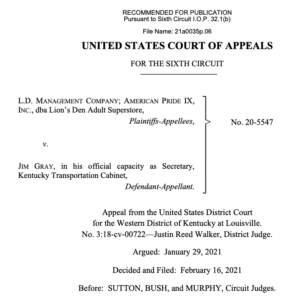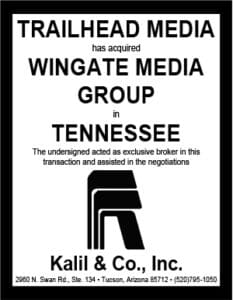
A federal appeals court upheld a lower court ruling that Kentucky’s billboard violates constitutional protection of free speech.
Bottom line: the US Sixth Circuit Court of Appeals repeated its legal standard. That standard says regulations which distinguish between on-premise and off-premise signs are based on content, and, therefore, violate the First Amendment (L.D. Management v. Jim Gray, February 16, 2021). You can read the ruling (which is fairly short) here.
Background on the Kentucky case
The appeals court ruling:
Lion’s Den displays a billboard, affixed to a tractor-trailer, on a neighbor’s property that advertises its nearby adult bookstore. Kentucky’s Billboard Act prohibits such off-site billboards when, as in this case, the advertisement is not securely affixed to the ground, the sign is attached to a mobile structure, and no permit has been obtained. None of these requirements applies to an on-site billboard advertisement, and the Act applies equally to commercial and non-commercial speech on billboards. In response to a First (and Fourteenth) Amendment challenge to the Act, the district court prohibited the Commonwealth from enforcing its law. We affirm, as the Billboard Act regulates commercial and non-commercial speech on content-based grounds and is not tailored to achieve Kentucky’s purported interests.
Lion’s Den sued the Commonwealth in federal district court, claiming the Billboard Act violated the First Amendment and seeking an injunction against its enforcement. The district court agreed and granted summary judgment to Lion’s Den. It declared the Billboard Act unconstitutional on its face and as applied to Lion’s Den.
The link between the Kentucky and Tennessee cases
Just last year, we held that an “on-premises exception” applicable to commercial and non-commercial speech alike in Tennessee’s Billboard Act made it content-based. Thomas v. Bright, 937 F.3d 721, 729 (6th Cir. 2019). Deciding whether the exception should apply, we said, would require reading the sign’s message and determining its meaning or purpose. No material difference exists between the two laws. Perhaps for that reason, the Commonwealth conceded below that the Kentucky Act regulated speech based on its content.
Legislative Response
Tennessee revised its billboard law last year, in response to the legal challenge. Similar revisions to billboard laws occurred earlier in Texas and Oregon.
Kentucky is considering a legislative remedy, pending in the Kentucky House of Representatives. Legislative action was delayed this week due to weather. The pending Kentucky proposal would regulate signs involving “compensation,” defined as:
“Compensation” means the exchange of anything of value, including money, securities, real property interests, personal property interests, goods or services, promises of future payments, or forbearance of debt.
Appellate judges in the Kentucky case
A three-judge panel of the US Sixth Circuit Court of Appeals issued the ruling in the Kentucky billboard case. These appellate judges are:
- Jeffrey Sutton, nominated by President George W. Bush
- John Bush, nominated by President Donald Trump
- Eric Murphy, nominated by President Donald Trump
[wpforms id=”9787″]
Paid Advertisement

















